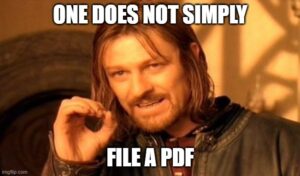While most TCPA litigation has faded away after significant amendments to its scope, the statute still has impact when it applies. In Buttles v. Infinite Fin. Corp., for example, the Fifth Court reversed the denial of a TCPA motion as to a business-disparagement claim when the plaintiff’s evidence “is devoid of any specific facts illustrating how [his] alleged misrepresentations … caused any specific, demonstrable loss.” No. 05-23-00138-CV (July 30, 2024) (mem. op.).
Monthly Archives: July 2024
Twice in recent days, the Fifth Court has reminded: “A relator who delays seeking mandamus relief, even a delay of only a few months, may waive the right to mandamus unless the relator can justify the delay.” So when planning for a potential mandamus, try to avoid having this sentence appear in the opinion about it:
“Based on the petition and the record before us, relators waited until the eve of trial and over ten months from the challenged ruling before seeking mandamus relief.”
E.g., In re Auto Club County Mut. Ins. Co., No. 05-24-00867-CV (July 24, 2024) (mem. op.).
 Putnam wanted $6,000 back from the county courts, that he had posted earlier as a supersedeas deposit. Unsuccessful in obtaining the money from the clerk’s office, he sued the county clerk, who obtained dismissal on jurisdictional grounds. The Fifth Court, after modifying the dismissal to be “without prejudice,” encouraged Putnam to seek relief from the probate judge rathe than the clerk:
Putnam wanted $6,000 back from the county courts, that he had posted earlier as a supersedeas deposit. Unsuccessful in obtaining the money from the clerk’s office, he sued the county clerk, who obtained dismissal on jurisdictional grounds. The Fifth Court, after modifying the dismissal to be “without prejudice,” encouraged Putnam to seek relief from the probate judge rathe than the clerk:
Putnam’s claim is for the return of a deposit he paid to supersede a probate court order issued in connection with the administration of Powell’s estate. We conclude his claim arises from an estate administration and is thus a probate proceeding. Further, Putnam’s claim does not fit within the examples of “matters related to a probate proceeding” in [Tex. Probate Code] § 31.002, most of which involve claims brought by or against an estate’s personal representative. The probate court had exclusive jurisdiction over Putnam’s claim, and the county court did not err in granting Warren’s plea to the jurisdiction.
No. 05-23-00235-CV (July 26, 2024) (mem. op.).
 The defendant in Porturas v. Anglobaldo argued that as a citizen of Peru, she was not subjet to personal jurisdiction. But the Fifth Court affirmed the rejection of her special appearance, because she had been personally served with process in Texas. No. 05-23-00919-CV (July 22, 2024) (mem. op.) (applying Burnham v. Superior Court, 495 U.S. 604 (1990)).
The defendant in Porturas v. Anglobaldo argued that as a citizen of Peru, she was not subjet to personal jurisdiction. But the Fifth Court affirmed the rejection of her special appearance, because she had been personally served with process in Texas. No. 05-23-00919-CV (July 22, 2024) (mem. op.) (applying Burnham v. Superior Court, 495 U.S. 604 (1990)).
The plaintiff in Moore v. Dallas Morning News had an unusual argument against the one-year statute of limitations claim for a libel claim: he was incarcerated and couldn’t access the article at issue. The Fifth Court didn’t accept his argument, particularly when the plaintiff was – literally – aware of his alleged injury:
Moore complains that because he had no access to a telephone with an internet connection, he did not actually see and read the Article until months after he was released from incarceration. But the Article was not hidden or undetectable; it was readily available to the public. The fact that Moore himself did not read the Article within one year did not mean his injury was undiscoverable. It is the plaintiff’s injury that must be inherently undiscoverable to invoke the discovery rule. As we have repeated, Moore learned of the injury to his reputation when he was attacked in prison.
No. 05-22-01286-CV (July 17, 2024) (mem. op.).
In MGO, LLC v. Accessology Too, LLC, a frustrated judge said:
If I need to order additional production, if you have objections that you are not sure about, I would urge you not to make frivolous or unnecessary objections, because, on the 14th, if it looks like people are still stalling, or trying not to hand over relevant information, I have been known to award attorney’s fees for that kind of behavior. And since we are coming up on the eve of trial, if it looks like you have something that is relevant and clearly within the scope of discovery and you’re hanging it up on some kind of technicality, that Friday is not going to go very well for your client.
While sincere and pointed, that statement didn’t satisfy the prerequisite for death-penalty sanctions of considering lesser sanctions:
[A]n order compelling discovery responses, coupled with an unequivocal warning that noncompliance would result in dismissal, constitutes a lesser sanction that can support a subsequent death-penalty sanction. However, equivocal warnings of future sanctions do not constitute lesser sanctions. The trial judge’s remarks in this case were equivocal warnings about future sanctions and did not specifically mention the possibility of death-penalty sanctions at all.
No. 05-23-00100-CV (July 17, 2024) (mem. op.) (citations and emphasis omitted).
 New TRAPs confirm that appellate filings need to include bookmarked .pdf files. A good practice anyway, the rules now make this practice an express requirement.
New TRAPs confirm that appellate filings need to include bookmarked .pdf files. A good practice anyway, the rules now make this practice an express requirement.
If you enjoyed David Coale & Ben Taylor, Judgment Rendition in Texas, 75 Baylor L. Rev. 354 (2023), then you will enjoy Serafine v. Crump‘s resolution of whether an appeal begins a new “case”:
[T]he question is whether the proceeding “commences” a new civil action or “maintains” the original one. In other words, an appeal to an intermediate appellate court and a petition for review to a supreme court are within the same “litigation” if they are a part of the same “civil action” that is simply “pending” in different courts. A long and unbroken line of our precedent answers this question clearly and unequivocally: an appeal is simply the “continuation of the action in suit brought in the trial court.”
No. 23-0272 (Tex. June 21, 2024).
At issue in Green v. City of DeSoto was whether an exception to horizontal stare decisis–an intervening decision by a higher court–allowed a plaintiff’s otherwise-barred claim to proceed. The question developed as follows:
- An earlier Fifth Court case upheld a defense summary judgment on immunity grounds because “the evidence showed the damage to the [railroad] tracks was caused by the derailment, not directly by the vehicles while placing the road-base material on the tracks.”
- An intervening supreme court case found no immunity when a government employee failed to set the emergency break in a parked van, and the van caused damage when it went into motion.
- This case was controlled by the earlier Fifth Court opinion. The collision of the van in the supreme court was a material distinction here: “[T]he Greens’ damages were not caused directly by the motorized equipment. The City’s equipment created the condition, the dirt dam, that led to the flooding of the Greens’ property and the Greens’ damages. This is insufficient to create the required nexus between the City’s use of motor-driven equipment and the Greens’ damages.”
No. 05-23-00740-CV (July 9, 2024) (mem. op.).
A recent need for maintenance on my F-150 pickup caused me to read through the manual, which led me to appreciate how well-organized and readable it was. So I wrote “Why You Should Write Briefs Like Car Manuals” for the Bar Association of the Fifth Federal Circuit (available along with many other practical short articles in the “for members” section of its website). I hope you enjoy it and find the article of some use in your practice!
The history-minded will recall that Marbury v. Madison, 5 U.S. 137 (1803), turned on a tension between the Judiciary Act and the Constitution’s grant of federal-court jurisdiction. So too, Justice Young’s concurrence in the denial of the mandamus petition in In re Dailey, No. 24-0382 (Tex. July 5, 2024), in which the petitioner challenged the handling of an FED petition by a justice of the peace:
Article V, § 3(a) of the Texas Constitution, however, provides that “[t]he Legislature may confer original jurisdiction on the Supreme Court to issue writs of quo warranto and mandamus in such cases as may be specified, except as against the Governor of the State.” In turn, the statute describing this Court’s general mandamus jurisdiction simultaneously announces some proper respondents (“a statutory county court judge, a statutory probate court judge, a district judge, a court of appeals or justice of a court of appeals, or any officer of state government”) and excludes some potential respondents (“the governor, the court of criminal appeals, or a judge of the court of criminal appeals”). Tex. Gov’t Code § 22.002(a). The only constitutionally impermissible respondent is the governor. See Tex. Const. art. V, § 3(a). But given the enumeration in the current statute, and that the enumeration does not include justice courts (although they are not expressly disclaimed by statute, either), the sounder approach has been to regard this Court’s mandamus jurisdiction as not reaching such courts unless it is necessary to enforce our own jurisdiction. See Pope v. Ferguson, 445 S.W.2d 950, 952 (Tex. 1969).
No. 24-0382 (Tex. July 5, 2024).
Liebbe v. Courtney, discussed earlier this week as to its holding about damages, also reversed a sanctions order, stating:
… from the record before us, we cannot conclude the evidence gives rise to an inference of intent or willfulness or indicates improper motive on Liebbe’s part. As a result, we conclude the trial court abused its discretion by assessing sanctions against Liebbe under its inherent authority without finding bad faith, both with regard to the order to pay TLAP and take additional CLE hours, as well as with regard to the order to pay attorneys’ fees, a matter we address next.
No. 05-22-00158-CV (July 5, 2024) (citations omitted, emphasis added).
 GDS Transport, LLC v. MV Transp., Inc. reversed a dismissal under Rule 91a, in no small part because of a mismatch between the grounds in the motion and the plainitff’s specific theories of liability.
GDS Transport, LLC v. MV Transp., Inc. reversed a dismissal under Rule 91a, in no small part because of a mismatch between the grounds in the motion and the plainitff’s specific theories of liability.
Specifically, the plaintiff’s breach-of-contract claim alleged that the defendant wrongfully deducted “maintenance costs” from the amount owed under the contract. The defendant cited a limitation-of-liability provision that, admittedly, foreclosed liability for operational costs. But “the damages sought are not maintenance costs,” said the Fifth Court: “Rather, they are the amount of an offset improperly taken from amounts owed ….” No. 05-23-00067-CV (June 24, 2024) (mem. op.).
A substantial tort judgment in favor of a doctor was reversed in Liebbe v. Courtney, in which the Fifth Court held:
there was no evidence, or, at a minimum, no more than a scintilla of evidence, of any causal link between Liebbe’s and Rute’s tortious conduct and the damages awarded on those claims. In short, we conclude there was legally insufficient evidence that Liebbe’s or Rute’s tortious conduct caused the lost profits the jury assessed at trial, particularly when appellees themselves identified the WFAA/Channel 8 stories as the root of the harm.
No. 05-22-00158-CV (July 5, 2024).
Hopefully the big water leak at 600 Commerce can be repaired soon and return the courthouse to normal operations.